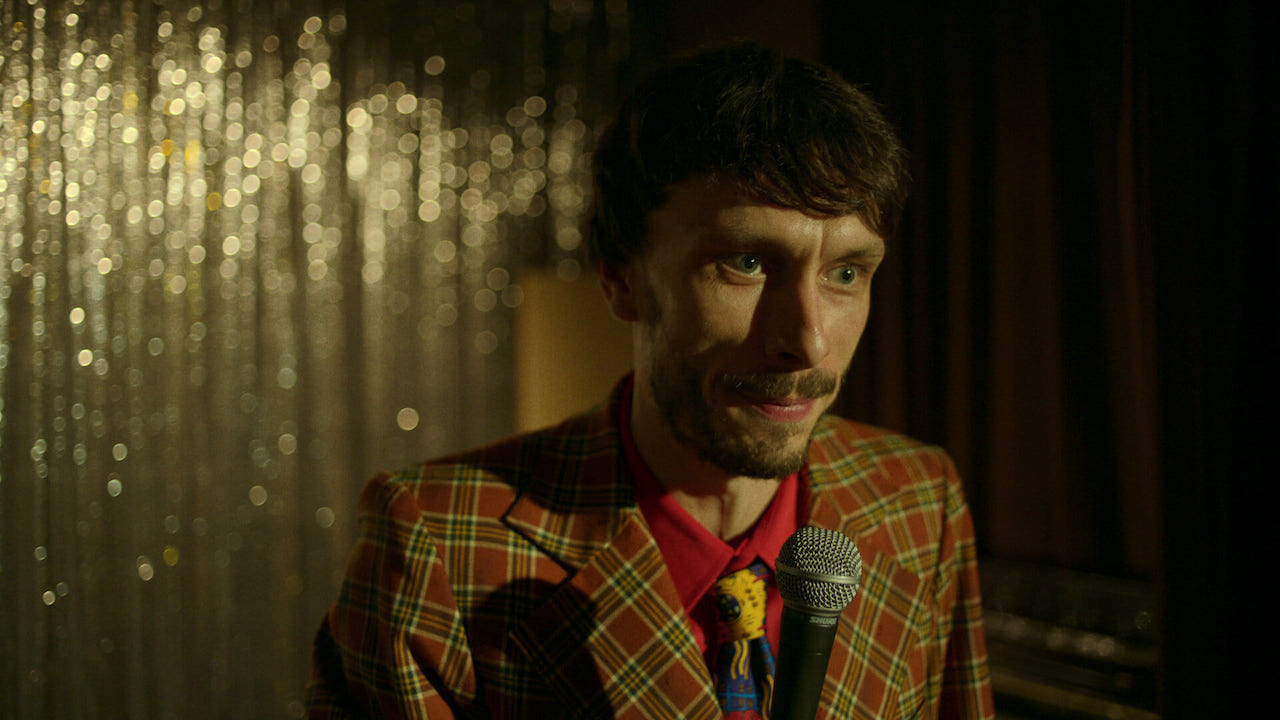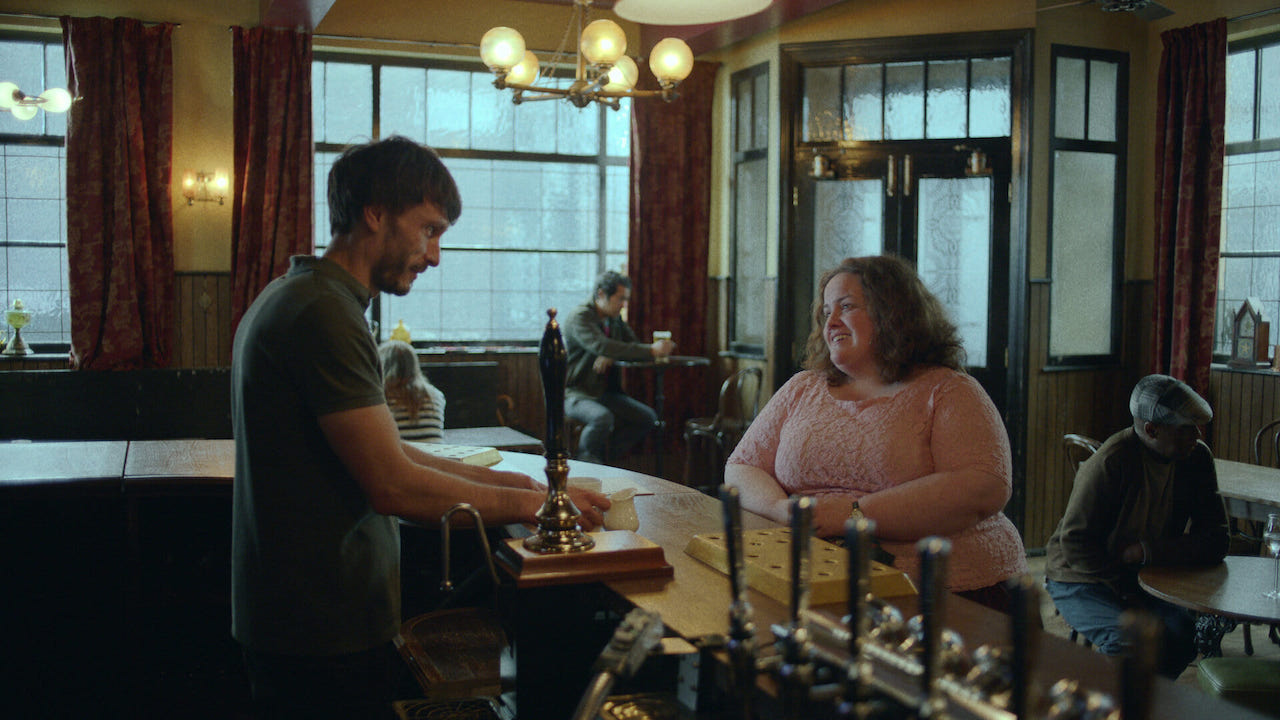Fight, flight, freeze or fawn: Baby Reindeer will shake your nervous system

Scottish comedian Richard Gadd’s true stalker story gives way to stinging self-reckoning, in addictive Netflix miniseries Baby Reindeer. Eliza Janssen reckons you’ll get obsessed, too—especially after the devastating impact of episode four.
Walter Bradford Cannon’s 1915 paper on “bodily changes in pain, hunger, fear, and rage” first defined the ways in which all animals—humans included—respond to threats through a distinct binary: fight or flight. If a strange customer at your pub begins flirting with you, then harassing you, and then escalates to 40,000+ emails, Facebook comments, and texts, one of these responses might be suitable. Stand your ground and bite back at this awkward woman, knowing that you may be overreacting or making the situation worse, or run away from the problem entirely.
In the century since this physiological study, two other behaviours have been rightfully included: the “freeze” response, prey being paralysed with fear and unable to take any action at all, and “fawn”, a compulsion to flatter and please the predator in order to survive with minimal damage. “Fawn” is an apt term here when describing the psychological wallop of Baby Reindeer, a new Netflix series that offers up a saucy true tale of its creator’s experience with an unhinged stalker, before instead sinking its teeth into our victimised protagonist’s perspective. What would cause someone to react to such a threat with passivity, or even encouragement? What would drive them to make a Netflix show about it?
The opening episodes are hilarious and scandalous, like hearing your mate recall a shockingly bad date. Until they curdle into jaw-dropping revelations about abuse, trauma, self-loathing—like realising that your mate is still haunted by this person, that their juicy anecdote has painful, permanent implications. Realising that maybe you shouldn’t be laughing anymore.
It’s unclear how closely the events of the miniseries follow writer and star Richard Gadd’s real experience, which he’s previously adapted for multiple award-winning Edinburgh Fringe comedy shows. This might be for safety reasons, or as an olive branch of sorts to Gadd’s actual stalker, who he depicts here as not a villain but merely a foil to his own flaws. His analogue in the series, struggling alt-comic Donny Dunn, takes pity on a teary-eyed newcomer to his pub, offering her free Diet Cokes and attention. This stalker, Martha, is scripted and performed (by Jessica Gunning) with a knife-edge empathy: she can flip from pitiful to terrifying, and then back around to disarmingly clever and funny, in single shots or lines of dialogue.
The pilot episode relishes each outrageous nugget of Martha’s madness, emblazoning her clinging “Sent from my iPhone” messages to Donny onscreen, rife with appalling spelling and references to Donny as her beloved “baby reindeer”. Most shocking of all, however, is the final scene, in which Donny knuckles down on Google to find headlines of Martha’s past stalking convictions, a criminal record, a mugshot…and finally clicks “accept” to her menacing FB friend request.
Without dwindling into victim blaming, this unsettling and addictive miniseries focuses more on the weaknesses and sins of its stalk-ee than the giggling human hurricane who destroys his life. Because, as the crushing fourth episode reveals, Gadd’s protagonist is already destroyed in far more significant ways than Martha can muster. Weronika Tofilska directs every episode with sickening close-ups and horror movie pacing, an exciting elaboration on her co-writing work on Love Lies Bleeding earlier this year. Both projects cover darkly codependent relationships, and both are twisted fun in their own right: but Baby Reindeer is more successful in examining how a new, twisted relationship can bring repressed past pain violently to the surface of the present day.

This is probably due to Gadd’s vulnerable position in the story. One imagines that it would’ve been extremely triggering to re-enact some of these brutal chapters in your own personal history, and yet Gadd holds nothing back in making Donny just as flawed and, sometimes, just as loathsome as his stalker. Our protagonist is passive to a fault; he lies to the transwoman he’s dating (Nava Mau) so that his queer desires won’t be tied back to his blokey friends; he’s reckless with Martha’s feelings, only giving himself and the cringing viewer more grief; and beyond all of that, he’s a terrible comedian. Agonising scenes of Donny bombing onstage, even before Martha begins heckling him with Nancy Sinatra songs from the audience, feed right back into the show’s central questions, of the warped, dangerous, and heartbreakingly human hunger for attention. We feel sick schadenfreude at watching our hero fail so publicly, and it makes his later admissions of identity-shaking assault in the pursuit of comedy greatness hit all the more hard.
Both Martha and her latest “baby reindeer” are hopelessly broken people, their disgraces, admirable qualities, and trauma only complicating the brew even further for being based on real people. Are we the only true exploiters here, tuning in for another elevated “based on real events” shocker from a streaming service? Baby Reindeer reminded me most of Michaela Coel’s scintillating show I May Destroy You; both series focus on shadowy, suppressed memories of sexual abuse, experienced by hollowed-out London artists, and both spike their devastating, soul-searching flashbacks with laugh-out-loud British comedy.
I blazed through the first four episodes of the show in one sitting, taking a necessary overnight breather after that gut-punch, lengthier fourth chapter before waking up with Baby Reindeer‘s characters still stalking the inside of my head. I imagine it’ll have a similar grip on many other Netflix subscribers, watching with wide-eyes or from between their fingers, before hurriedly Googling Richard Gadd’s real story to see which bits are tragically true.

















